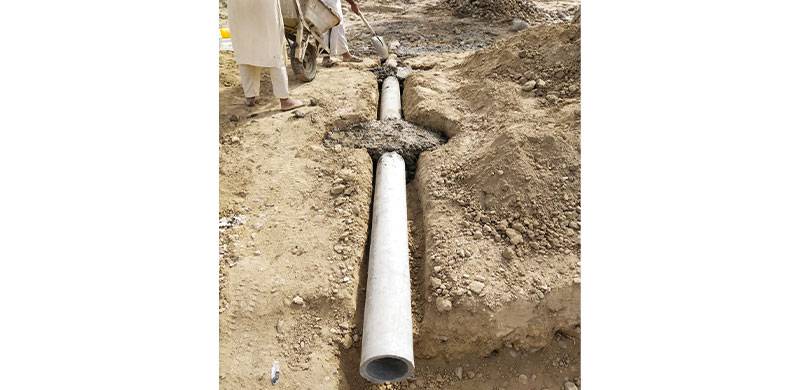
The district administration and three elected tehsils mayors kicked off one of a kind Aquifer for Groundwater Management project in Lakki Marwat, Khyber Pakhtunkhwa, on June 16, 2022. This aquifer recharge project involved drilling wells in 37 locations along Rivers Gambeela and Kurram.
Last year, Deputy Commissioner (DC) Iqbal Hussain had led an initiative to store rainwater by constructing storage traps in rainwater drains. “We did not use government funds for the pilot project,” says Hussain. “Tehsil Chairman Ghazni Khel Zeeshan Muhammad Khan, Tehsil Mayor Lakki City Shahfqat Ullah Khan and Tehsil Mayor Sarai Naurang Aziz Ullah Khan funded the pilot project in their personal capacities.”
DC, who got the idea of aquifers from a YouTube video, says that direct aquifer recharge is a sustainable way to store water for future generations.
The district public health department statistics illustrate that the water table is going down by 10 feet each year. The recharge of underground water is slower than the rate of extraction. According to Lakki Marwat’s district agriculture extension department, 70 percent of gram and wheat crops are affected due to low rainfall. Seventy four percent of Lakki Marwat land is arid while 26 percent is dependent on canal water. According to the KP Meteorological Department, Lakki Marwat has recorded the lowest rainfall in last two years in KP.
Tehsil Mayor Sarai Naurang Aziz Ullah Khan says, “The KP government is not interested in strengthening the local governments. It is not releasing sufficient funds for the development of the area. We are facing acute water scarcity.”
The IMF ranked Pakistan third among the countries facing severe water storage. Water scarcity occurs when water demand is greater than the available supply. Though merely a small step in the right direction, “we are trying to adopt new age technology to address water shortage,” says DC Lakki Marwat. “We need technology to overcome water scarcity. We don’t have that technology at the government level. We need a comprehensive policy across Pakistan to overcome water related challenges.”
The United Nations-led organisation, the Intergovernmental Panel on Climate Change (IPCC), published the sixth assessment report finds that human activity is rising global temperature, and the world will face severe water crisis. Large investments must therefore be made urgently to find effective solutions.
Last year, Deputy Commissioner (DC) Iqbal Hussain had led an initiative to store rainwater by constructing storage traps in rainwater drains. “We did not use government funds for the pilot project,” says Hussain. “Tehsil Chairman Ghazni Khel Zeeshan Muhammad Khan, Tehsil Mayor Lakki City Shahfqat Ullah Khan and Tehsil Mayor Sarai Naurang Aziz Ullah Khan funded the pilot project in their personal capacities.”
DC, who got the idea of aquifers from a YouTube video, says that direct aquifer recharge is a sustainable way to store water for future generations.
The district public health department statistics illustrate that the water table is going down by 10 feet each year. The recharge of underground water is slower than the rate of extraction. According to Lakki Marwat’s district agriculture extension department, 70 percent of gram and wheat crops are affected due to low rainfall. Seventy four percent of Lakki Marwat land is arid while 26 percent is dependent on canal water. According to the KP Meteorological Department, Lakki Marwat has recorded the lowest rainfall in last two years in KP.
The district public health department statistics illustrate that the water table is going down by 10 feet each year. The recharge of underground water is slower than the rate of extraction.
Tehsil Mayor Sarai Naurang Aziz Ullah Khan says, “The KP government is not interested in strengthening the local governments. It is not releasing sufficient funds for the development of the area. We are facing acute water scarcity.”
The IMF ranked Pakistan third among the countries facing severe water storage. Water scarcity occurs when water demand is greater than the available supply. Though merely a small step in the right direction, “we are trying to adopt new age technology to address water shortage,” says DC Lakki Marwat. “We need technology to overcome water scarcity. We don’t have that technology at the government level. We need a comprehensive policy across Pakistan to overcome water related challenges.”
The United Nations-led organisation, the Intergovernmental Panel on Climate Change (IPCC), published the sixth assessment report finds that human activity is rising global temperature, and the world will face severe water crisis. Large investments must therefore be made urgently to find effective solutions.

